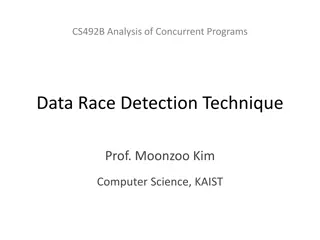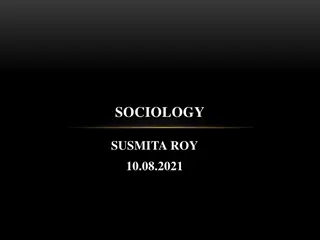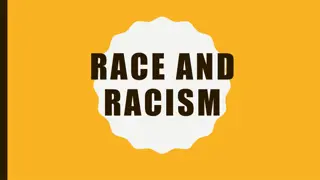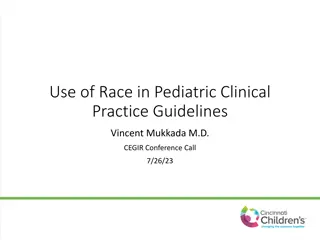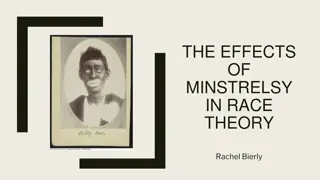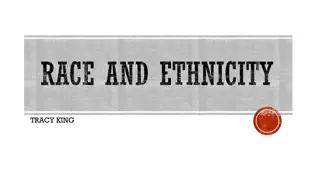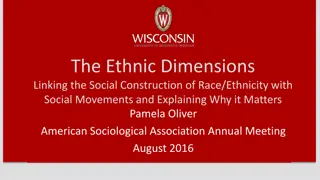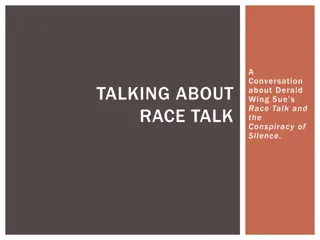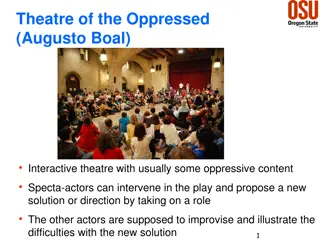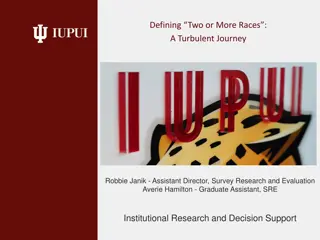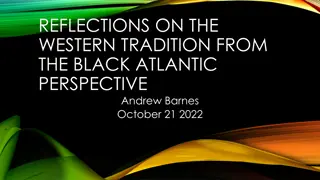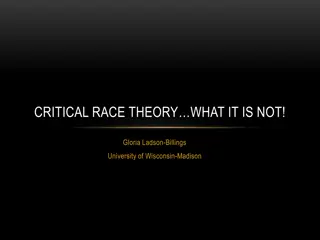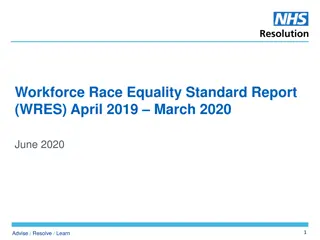Understanding Race: Appiah's Perspective on Racialism
Delve into Anthony Appiah's exploration of racialism, where he challenges the notion of races and racial essence. Through his arguments, he sheds light on the concept of racial inequality, institutional racism, and the complexities of defining race. Appiah's stance on racialism being false opens up discussions on the meaningfulness and implications of the term "race."
Download Presentation

Please find below an Image/Link to download the presentation.
The content on the website is provided AS IS for your information and personal use only. It may not be sold, licensed, or shared on other websites without obtaining consent from the author. Download presentation by click this link. If you encounter any issues during the download, it is possible that the publisher has removed the file from their server.
E N D
Presentation Transcript
Racisms { Anthony Appiah
The Problem of Racial Inequality/Disparity Individual racial prejudice Colorblind approach vs. Institutional racism White Privilege General Problem to Consider
there are heritable characteristics, possessed by members of our species, that allow us to divide them into a small set of races, in such a way that all the members of these races share certain traits and tendencies with each other that they do not share with members of any other race. These traits and tendencies characteristic of a race constitute, on the racialist view, a sort of racial essence; and it is part of the content of racialism that the essential heritable characteristics...account for more than the visible morphological characteristics skin color, hair type, facial features on the basis of which we make our informal classifications. (Appiah 5) Racialism
Appiah argues (elsewhere) that racialism is false; even if there are what we might call superficial races, i.e., groups of people who share certain inherited visible features, there are no racial kinds, i.e., groups unified by sharing a racial essence. Racialism is false
Do races exist? Are there any races? Am I a member of the white (black, Asian, Latina/o, native/indigenous) race? How do we determine the answers to these questions? What does the term race mean? Is it ever true to say that, i.e. Ashley is white and Isaac is black?
For the sake of clarity: race refers to the word or idea race refers to the extension or referent of the term Is witch a meaningful term? Well, there seems to be a concept associated with witch. if someone tells us they saw a horror movie about witches, we understand what they mean. But, there are no witches: the concept witch applies to no existing individuals. Is race a meaningful term?
Appiah maintains that racialists hold a false or incorrect view, but because racialism makes no moral or evaluative claims (it doesn't say anything about what's good or bad, what we ought to do or not do), there is nothing wrong morally speaking in being a racialist. As he puts it, racialism "seems to be a cognitive rather than a moral problem." (5) Racialism is normatively neutral
...extrinsic racists make moral distinctions between members of different races because they believe that the racial essence entails certain morally relevant qualities. The basis for the extrinsic racists' discrimination between people is their belief that members of different races differ in respects that warrant the differential treatment, respects such as honesty or courage or intelligence that are uncontroversially held...to be acceptable as a basis for treating people differently. (Appiah 5) Extrinsic Racism
An extrinsic racist maintains that people of racial group X tend to have the property P, and P is a morally objectionable property (such as dishonesty, laziness, irrationality, violent etc.) So we are warranted in treating people of racial group X differently (i.e., worse) than others (for at least some apparent racial group X). in other words
Intrinsic racism: ...intrinsic racists...are people who differentiate morally between members of different races because they believe that each race has a different moral status, quite independent of the moral characteristics entailed by its racial essence....an intrinsic racist holds that the bare fact of being the same race is a reason for preferring one person to another. (Appiah 5-6) Intrinsic Racism
An intrinsic racists maintains that people of racial group X are inherently morally inferior (for at least some apparent racial group X). in other words
For Appiah, racial prejudice consists in "the deformation of rationality in judgment [viz., their systematic "incapacity" to collect and assess evidence responsibly] that characterizes those whose racism is more than a theoretical attachment to certain propositions about race." (8) In other words: what appropriately deserves to be called racism is not just a matter of what you believe, but how you believe it. Racism as Cognitive Error
Appiah thinks it a "plain fact" that our species is prone morally and intellectually to distortions of justice that reflect partiality. Yet we are not powerless to resist the tendency. "There is no subject matter about which most sane people cannot, in the end, be persuaded to avoid partiality in judgment." Appiah suggests that racism is symptomatic of a kind of irrationality. (at least for extrinsic racists). For intrinsic racists, racism represents a moral failure. Appiah s commentary


